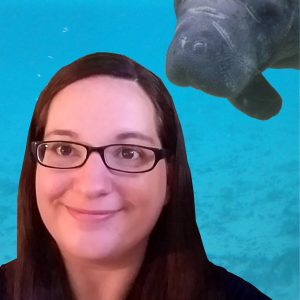Education
Ph.D. in Biological Oceanography, Florida State University
M.S. in Biological Oceanography, Florida State University
BA. in Biological Psychology, New College of Florida
Dr. Rycyk specializes in sirenian biology, including manatee-boat interactions, vocal communication, and acoustic ecology. Florida manatees are threatened in part by mortality from boat collisions and her research has identified acoustic, behavioral, and environmental factors that influence manatee behavior around boats. In some environments, manatees can be difficult to visually survey. Dr. Rycyk has developed methods to use manatee vocalizations for ecological surveys through passive acoustic monitoring. These methods are currently being applied and expanded in several African countries. The foundation for this work began with the help of New College students to produce the first characterization of African manatee vocalizations. Dr. Rycyk is also a board member of the Sarasota Bay Listening Network and has interests in acoustic ecology of Sarasota Bay, including temporal and spatial patterns in sound production by bottlenose dolphins, manatees, and soniferous fish. In her research she stresses the use of objective, reproducible, computational methods to extract behavioral and acoustic signals of interest in large datasets. Dr. Rycyk’s teaching spans biology, ecology, acoustics, and oceanography.
Recent Courses
Marine Mammal Biology
Animal Behavior
Animal Behavior Laboratory
Marine Ecology Laboratory
Research Methods in Biology
Website
Recent News
Hakai Magazine: All Quiet Under the Algal Bloom
Tracking the sounds of Sarasota Bay
New College researchers study African manatees
AMMCO: First ever recording of the African manatee vocalization in the wild
Selected Publications
Factheu, C., Rycyk A., Sévilor, K., Keith-Diagne, L., Ramos, E. A., Kikuchi, M., and Takoukam Kamla, A. 2023. “Acoustic methods improve the detection of the endangered African manatee”. Frontiers in Marine Science, 9:1032464, https://doi.org/10.3389/fmars.
Rycyk, Athena, Bolaji, Dunsin, Factheu, Clinton, and Takoukam, Aristide 2022. “Using transfer learning with a convolutional neural network to detect African Manatee (Trichechus senegalensis) vocalizations”, JASA Express Letters, 2(12), 121201, https://doi.org/10.1121/10.001
Rycyk, A. M., Bauer, G. B., Wells, R. S., Gaspard III, J. C., & Mann, D. A. 2022. “The influence of variations in background noise on Florida manatee (Trichechus manatus latirostris) detection of boat noise and vocalizations”. PLOS ONE, 17(5), 21. https://doi.org/10.1371/journa
Rycyk, A. M., Berchem, C., & Marques, T. A. 2022. “Estimating Florida manatee (Trichechus manatus latirostris) abundance using passive acoustic methods”. JASA Express Letters, 2(5), 8. https://doi.org/10.1121/10.001
Rycyk, Athena M., Clinton Factheu, Eric A. Ramos, Beth A. Brady, Mumi Kikuchi, Hannah F. Nations, Karianne Kapfer, Cecilia M. Hampton, Emily R. Garcia, and Aristide Takoukam Kamla. 2021. “First Characterization of Vocalizations and Passive Acoustic Monitoring of the Vulnerable African Manatee (Trichechus senegalensis).” J. Acoust. Soc. Am. 150 (4): 3028–37. https://doi.org/10.1121/10.0006734.
Rycyk, Athena M., Reny B. Tyson Moore, Randall S. Wells, Katherine A. McHugh, Elizabeth J. Berens McCabe, and David A. Mann. 2020. “Passive Acoustic Listening Stations (PALS) Show Rapid Onset of Ecological Effects of Harmful Algal Blooms in Real Time.” Scientific Reports 10 (1): 17863. https://doi.org/10.1038/s41598-020-74647-z.
Rycyk, Athena M., Charles J. Deutsch, Margaret E. Barlas, Stacie K. Hardy, Katherine Frisch, Erin H. Leone, and Douglas P. Nowacek. 2018. “Manatee Behavioral Response to Boats.” Marine Mammal Science 34 (4): 924–62. https://doi.org/10.1111/mms.12491.

